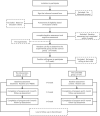Program for education and enrichment of relational skills (PEERS) training for social skills and depressed mood intervention in young adult with depression: Study protocol for a randomized controlled trial
- PMID: 36172511
- PMCID: PMC9510920
- DOI: 10.3389/fpsyt.2022.993124
Program for education and enrichment of relational skills (PEERS) training for social skills and depressed mood intervention in young adult with depression: Study protocol for a randomized controlled trial
Abstract
Introduction: Depression is a common psychiatric disorder characterized by persistent low mood, reduced interest, and slowed thinking. Young adults are the main first-onset group for depression in all categories of the population. Program for education and enrichment of relational skills (PEERS) training, a program for the Education and Enrichment of Relational Skills, has been used in Europe and America for people with various types of social disorders with good results. A Chinese adaptation of the PEERS training program may be a new approach to help youth with depression return to society as soon as possible. This study aimed to construct and optimize a social skills training program for Chinese young adults with depression and to validate the impact of the program.
Materials and methods and analysis: The aim of this trial protocol is to evaluate the efficacy of the localized PEERS training program on social competence, depressed mood in a Chinese young adult population with depression. The primary outcome will be a change in self-reported depressive symptoms from baseline to week 3 post-randomization to week 6 post-randomization measured using the Liebowitz social anxiety scale (LSAS). Secondary outcomes include the rate of decline in severe social anxiety, the Social Avoidance and Distress Scale (SAD), the Social Self-Efficacy Scale (PSSE), and the Hamilton Depression Scale (HAMD-17). Data for each assessment will be collected at baseline, week 3 of the trial, and week 6 of the trial.
Ethics and dissemination: Ethics approval was obtained from the Hospital Ethics Committee. Findings will be disseminated through scientific journals, conferences, and university courses.
Trial registration number: [http://www.chictr.org.cn/], identifier [ChiCTR2100046050].
Keywords: PEERS; depressed mood; randomized controlled trail; social function; youth depression.
Copyright © 2022 Hua, Zhao, Shen, Liu, Zheng and Zhang.
Conflict of interest statement
The authors declare that the research was conducted in the absence of any commercial or financial relationships that could be construed as a potential conflict of interest.
Figures
References
-
- World Health Organization [WHO]. Depression and Other Common Mental Disorders:Global Health Estimates;Licence: CC BY-NC -SA 3.0 IGO. Geneva: World Health Organization; (2017).
-
- World Bank Group. Out Of The Shadows: Making Mental Health A Global Development Priority. Washington, DC: World Bank Group; (2016).
LinkOut - more resources
Full Text Sources



